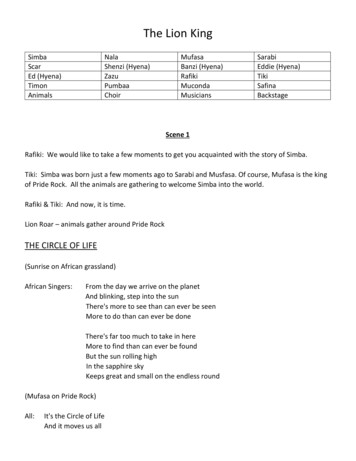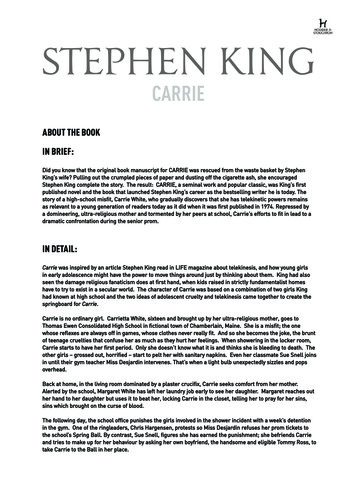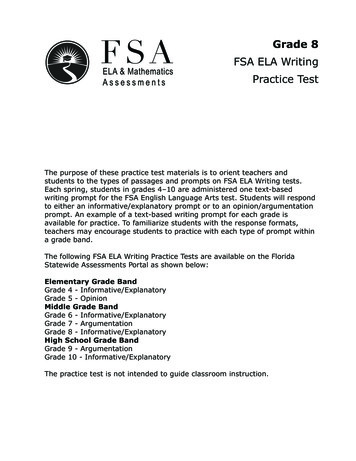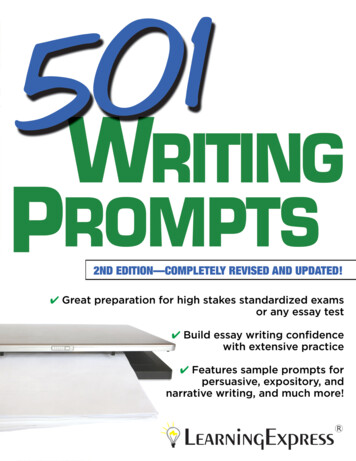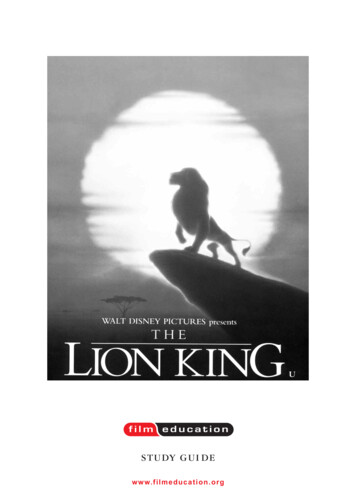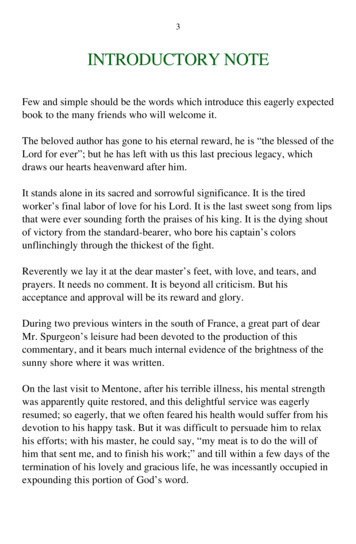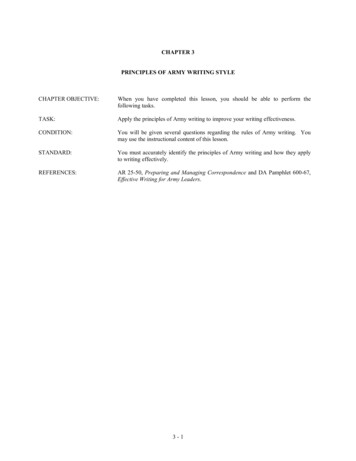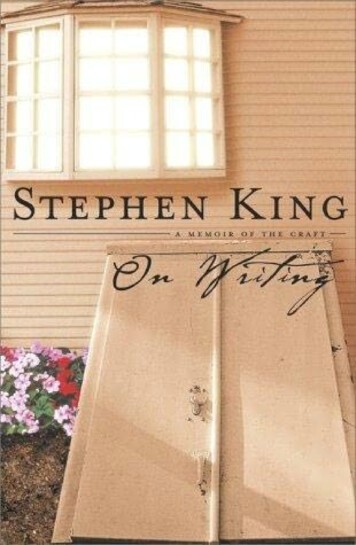
Transcription
l
lSCRIBNER1230 Avenue of the AmericasNew York, NY 10020Visit us on the World Wide Webhttp://www.SimonSays.comCopyright 2000 by Stephen KingAll rights reserved, including the right of reproduction in wholeor in part in any form.and design are trademarks of Macmillan LibraryReference USA, Inc., used under license bySimon & Schuster, the publisher of this work.SCRIBNERDESIGNED BY ERICH HOBBINGSet in Garamond No. 3Library of Congress Publication data is availableKing, Stephen, 1947–On writing : a memoir of the craft / by Stephen King.p. cm.1. King, Stephen, 1947– 2. Authors, American—20th century—Biography. 3. King,Stephen, 1947—Authorship. 4. Horror tales—Authorship. 5. Authorship. I. Title.PS3561.I483 Z475 2000813'.54—dc21 00-030105[B]ISBN 0-7432-1153-7Author’s NoteUnless otherwise attributed, all prose examples, both good and evil,were composed by the author.PermissionsThere Is a Mountain words and music by Donovan Leitch. Copyright 1967by Donovan (Music) Ltd. Administered by Peer International Corporation. Copyrightrenewed. International copyright secured. Used by permission. All rights reserved.Granpa Was a Carpenter by John Prine Walden Music, Inc. (ASCAP).All rights administered by WB Music Corp. All rights reserved. Used by permission.Warner Bros. Publications U.S. Inc., Miami, FL 33014.
Honesty’s the best policy.—Miguel de CervantesLiars prosper.—Anonymous
First ForewordIn the early nineties (it might have been 1992, but it’s hard toremember when you’re having a good time) I joined a rockand-roll band composed mostly of writers. The Rock BottomRemainders were the brainchild of Kathi Kamen Goldmark,a book publicist and musician from San Francisco. The groupincluded Dave Barry on lead guitar, Ridley Pearson on bass,Barbara Kingsolver on keyboards, Robert Fulghum on mandolin, and me on rhythm guitar. There was also a trio of“chick singers,” à la the Dixie Cups, made up (usually) ofKathi, Tad Bartimus, and Amy Tan.The group was intended as a one-shot deal—we wouldplay two shows at the American Booksellers Convention, geta few laughs, recapture our misspent youth for three or fourhours, then go our separate ways.It didn’t happen that way, because the group never quitebroke up. We found that we liked playing together too muchto quit, and with a couple of “ringer” musicians on sax anddrums (plus, in the early days, our musical guru, Al Kooper, atthe heart of the group), we sounded pretty good. You’d pay tohear us. Not a lot, not U2 or E Street Band prices, but maybewhat the oldtimers call “roadhouse money.” We took thegroup on tour, wrote a book about it (my wife took the pho7
Stephen Kingtos and danced whenever the spirit took her, which was quiteoften), and continue to play now and then, sometimes as TheRemainders, sometimes as Raymond Burr’s Legs. The personnel comes and goes—columnist Mitch Albom has replacedBarbara on keyboards, and Al doesn’t play with the group anymore ’cause he and Kathi don’t get along—but the core hasremained Kathi, Amy, Ridley, Dave, Mitch Albom, and me. . . plus Josh Kelly on drums and Erasmo Paolo on sax.We do it for the music, but we also do it for the companionship. We like each other, and we like having a chance totalk sometimes about the real job, the day job people arealways telling us not to quit. We are writers, and we never askone another where we get our ideas; we know we don’t know.One night while we were eating Chinese before a gig inMiami Beach, I asked Amy if there was any one question shewas never asked during the Q-and-A that follows almost everywriter’s talk—that question you never get to answer whenyou’re standing in front of a group of author-struck fans andpretending you don’t put your pants on one leg at a time likeeveryone else. Amy paused, thinking it over very carefully,and then said: “No one ever asks about the language.”I owe an immense debt of gratitude to her for saying that.I had been playing with the idea of writing a little bookabout writing for a year or more at that time, but had heldback because I didn’t trust my own motivations—why did Iwant to write about writing? What made me think I hadanything worth saying?The easy answer is that someone who has sold as manybooks of fiction as I have must have something worthwhile to sayabout writing it, but the easy answer isn’t always the truth.Colonel Sanders sold a hell of a lot of fried chicken, but I’m notsure anyone wants to know how he made it. If I was going to8
On Writingbe presumptuous enough to tell people how to write, I feltthere had to be a better reason than my popular success. Putanother way, I didn’t want to write a book, even a short onelike this, that would leave me feeling like either a literary gasbag or a transcendental asshole. There are enough of thosebooks—and those writers—on the market already, thanks.But Amy was right: nobody ever asks about the language.They ask the DeLillos and the Updikes and the Styrons, butthey don’t ask popular novelists. Yet many of us proles alsocare about the language, in our humble way, and care passionately about the art and craft of telling stories on paper.What follows is an attempt to put down, briefly and simply,how I came to the craft, what I know about it now, and howit’s done. It’s about the day job; it’s about the language.This book is dedicated to Amy Tan, who told me in a verysimple and direct way that it was okay to write it.9
Second ForewordThis is a short book because most books about writing arefilled with bullshit. Fiction writers, present company included,don’t understand very much about what they do—not why itworks when it’s good, not why it doesn’t when it’s bad. I figured the shorter the book, the less the bullshit.One notable exception to the bullshit rule is The Elements ofStyle, by William Strunk Jr. and E. B. White. There is little orno detectable bullshit in that book. (Of course it’s short; ateighty-five pages it’s much shorter than this one.) I’ll tell youright now that every aspiring writer should read The Elementsof Style. Rule 17 in the chapter titled Principles of Composition is “Omit needless words.” I will try to do that here.11
Third ForewordOne rule of the road not directly stated elsewhere in thisbook: “The editor is always right.” The corollary is that nowriter will take all of his or her editor’s advice; for all havesinned and fallen short of editorial perfection. Put another way,to write is human, to edit is divine. Chuck Verrill edited thisbook, as he has so many of my novels. And as usual, Chuck,you were divine.—Steve13
C.V.
I was stunned by Mary Karr’s memoir, The Liars’ Club. Notjust by its ferocity, its beauty, and by her delightful grasp ofthe vernacular, but by its totality—she is a woman whoremembers everything about her early years.I’m not that way. I lived an odd, herky-jerky childhood,raised by a single parent who moved around a lot in my earliest years and who—I am not completely sure of this—mayhave farmed my brother and me out to one of her sisters forawhile because she was economically or emotionally unable tocope with us for a time. Perhaps she was only chasing ourfather, who piled up all sorts of bills and then did a runoutwhen I was two and my brother David was four. If so, shenever succeeded in finding him. My mom, Nellie Ruth Pillsbury King, was one of America’s early liberated women, butnot by choice.Mary Karr presents her childhood in an almost unbrokenpanorama. Mine is a fogged-out landscape from which occasional memories appear like isolated trees . . . the kind thatlook as if they might like to grab and eat you.What follows are some of those memories, plus assortedsnapshots from the somewhat more coherent days of my adolescence and young manhood. This is not an autobiography. It17
Stephen Kingis, rather, a kind of curriculum vitae—my attempt to show howone writer was formed. Not how one writer was made; I don’tbelieve writers can be made, either by circumstances or by selfwill (although I did believe those things once). The equipmentcomes with the original package. Yet it is by no meansunusual equipment; I believe large numbers of people have atleast some talent as writers and storytellers, and that those talents can be strengthened and sharpened. If I didn’t believethat, writing a book like this would be a waste of time.This is how it was for me, that’s all—a disjointed growthprocess in which ambition, desire, luck, and a little talent allplayed a part. Don’t bother trying to read between the lines,and don’t look for a through-line. There are no lines—onlysnapshots, most out of focus.–1–My earliest memory is of imagining I was someone else—imagining that I was, in fact, the Ringling Brothers CircusStrongboy. This was at my Aunt Ethelyn and Uncle Oren’shouse in Durham, Maine. My aunt remembers this quiteclearly, and says I was two and a half or maybe three years old.I had found a cement cinderblock in a corner of the garageand had managed to pick it up. I carried it slowly across thegarage’s smooth cement floor, except in my mind I wasdressed in an animal skin singlet (probably a leopard skin) andcarrying the cinderblock across the center ring. The vastcrowd was silent. A brilliant blue-white spotlight markedmy remarkable progress. Their wondering faces told the story:never had they seen such an incredibly strong kid. “And he’sonly two!” someone muttered in disbelief.18
On WritingUnknown to me, wasps had constructed a small nest in thelower half of the cinderblock. One of them, perhaps pissed offat being relocated, flew out and stung me on the ear. The painwas brilliant, like a poisonous inspiration. It was the worstpain I had ever suffered in my short life, but it only held thetop spot for a few seconds. When I dropped the cinderblockon one bare foot, mashing all five toes, I forgot all about thewasp. I can’t remember if I was taken to the doctor, and neither can my Aunt Ethelyn (Uncle Oren, to whom the EvilCinderblock surely belonged, is almost twenty years dead),but she remembers the sting, the mashed toes, and my reaction. “How you howled, Stephen!” she said. “You were certainly in fine voice that day.”–2–A year or so later, my mother, my brother, and I were in WestDe Pere, Wisconsin. I don’t know why. Another of mymother’s sisters, Cal (a WAAC beauty queen during WorldWar II), lived in Wisconsin with her convivial beer-drinkinghusband, and maybe Mom had moved to be near them. If so,I don’t remember seeing much of the Weimers. Any of them,actually. My mother was working, but I can’t rememberwhat her job was, either. I want to say it was a bakery sheworked in, but I think that came later, when we moved toConnecticut to live near her sister Lois and her husband (nobeer for Fred, and not much in the way of conviviality, either;he was a crewcut daddy who was proud of driving his convertible with the top up, God knows why).There was a stream of babysitters during our Wisconsinperiod. I don’t know if they left because David and I were a19
Stephen Kinghandful, or because they found better-paying jobs, orbecause my mother insisted on higher standards than theywere willing to rise to; all I know is that there were a lot ofthem. The only one I remember with any clarity is Eula, ormaybe she was Beulah. She was a teenager, she was as big asa house, and she laughed a lot. Eula-Beulah had a wonderfulsense of humor, even at four I could recognize that, but it wasa dangerous sense of humor—there seemed to be a potentialthunderclap hidden inside each hand-patting, butt-rocking,head-tossing outburst of glee. When I see those hiddencamera sequences where real-life babysitters and nannies justall of a sudden wind up and clout the kids, it’s my days withEula-Beulah I always think of.Was she as hard on my brother David as she was on me? Idon’t know. He’s not in any of these pictures. Besides, hewould have been less at risk from Hurricane Eula-Beulah’sdangerous winds; at six, he would have been in the firstgrade and off the gunnery range for most of the day.Eula-Beulah would be on the phone, laughing with someone, and beckon me over. She would hug me, tickle me, getme laughing, and then, still laughing, go upside my headhard enough to knock me down. Then she would tickle mewith her bare feet until we were both laughing again.Eula-Beulah was prone to farts—the kind that are bothloud and smelly. Sometimes when she was so afflicted, shewould throw me on the couch, drop her wool-skirted butt onmy face, and let loose. “Pow!” she’d cry in high glee. It waslike being buried in marshgas fireworks. I remember thedark, the sense that I was suffocating, and I remember laughing. Because, while what was happening was sort of horrible,it was also sort of funny. In many ways, Eula-Beulah preparedme for literary criticism. After having a two-hundred-pound20
On Writingbabysitter fart on your face and yell Pow!, The Village Voiceholds few terrors.I don’t know what happened to the other sitters, but EulaBeulah was fired. It was because of the eggs. One morningEula-Beulah fried me an egg for breakfast. I ate it and askedfor another one. Eula-Beulah fried me a second egg, thenasked if I wanted another one. She had a look in her eye thatsaid, “You don’t dare eat another one, Stevie.” So I asked foranother one. And another one. And so on. I stopped afterseven, I think—seven is the number that sticks in my mind,and quite clearly. Maybe we ran out of eggs. Maybe I criedoff. Or maybe Eula-Beulah got scared. I don’t know, butprobably it was good that the game ended at seven. Seveneggs is quite a few for a four-year-old.I felt all right for awhile, and then I yarked all over thefloor. Eula-Beulah laughed, then went upside my head, thenshoved me into the closet and locked the door. Pow. If she’dlocked me in the bathroom, she might have saved her job, butshe didn’t. As for me, I didn’t really mind being in the closet.It was dark, but it smelled of my mother’s Coty perfume, andthere was a comforting line of light under the door.I crawled to the back of the closet, Mom’s coats and dressesbrushing along my back. I began to belch—long loud belchesthat burned like fire. I don’t remember being sick to mystomach but I must have been, because when I opened mymouth to let out another burning belch, I yarked againinstead. All over my mother’s shoes. That was the end forEula-Beulah. When my mother came home from work thatday, the babysitter was fast asleep on the couch and littleStevie was locked in the closet, fast asleep with half-digestedfried eggs drying in his hair.21
Stephen King–3–Our stay in West De Pere was neither long nor successful. Wewere evicted from our third-floor apartment when a neighborspotted my six-year-old brother crawling around on the roofand called the police. I don’t know where my mother waswhen this happened. I don’t know where the babysitter of theweek was, either. I only know that I was in the bathroom,standing with my bare feet on the heater, watching to see ifmy brother would fall off the roof or make it back into thebathroom okay. He made it back. He is now fifty-five and living in New Hampshire.–4–When I was five or six, I asked my mother if she had ever seenanyone die. Yes, she said, she had seen one person die and hadheard another one. I asked how you could hear a person dieand she told me that it was a girl who had drowned offProut’s Neck in the 1920s. She said the girl swam out past therip, couldn’t get back in, and began screaming for help. Several men tried to reach her, but that day’s rip had developeda vicious undertow, and they were all forced back. In the endthey could only stand around, tourists and townies, theteenager who became my mother among them, waiting for arescue boat that never came and listening to that girl screamuntil her strength gave out and she went under. Her bodywashed up in New Hampshire, my mother said. I asked howold the girl was. Mom said she was fourteen, then read me a22
On Writingcomic book and packed me off to bed. On some other day shetold me about the one she saw—a sailor who jumped off theroof of the Graymore Hotel in Portland, Maine, and landed inthe street.“He splattered,” my mother said in her most matter-offact tone. She paused, then added, “The stuff that came outof him was green. I have never forgotten it.”That makes two of us, Mom.–5–Most of the nine months I should have spent in the firstgrade I spent in bed. My problems started with the measles—a perfectly ordinary case—and then got steadily worse. I hadbout after bout of what I mistakenly thought was called“stripe throat”; I lay in bed drinking cold water and imagining my throat in alternating stripes of red and white (this wasprobably not so far wrong).At some point my ears became involved, and one day mymother called a taxi (she did not drive) and took me to a doctor too important to make house calls—an ear specialist.(For some reason I got the idea that this sort of doctor wascalled an otiologist.) I didn’t care whether he specialized inears or assholes. I had a fever of a hundred and four degrees,and each time I swallowed, pain lit up the sides of my face likea jukebox.The doctor looked in my ears, spending most of his time (Ithink) on the left one. Then he laid me down on his examining table. “Lift up a minute, Stevie,” his nurse said, and put alarge absorbent cloth—it might have been a diaper—undermy head, so that my cheek rested on it when I lay back23
Stephen Kingdown. I should have guessed that something was rotten inDenmark. Who knows, maybe I did.There was a sharp smell of alcohol. A clank as the ear doctor opened his sterilizer. I saw the needle in his hand—itlooked as long as the ruler in my school pencil-box—andtensed. The ear doctor smiled reassuringly and spoke the liefor which doctors should be immediately jailed (time ofincarceration to be doubled when the lie is told to a child):“Relax, Stevie, this won’t hurt.” I believed him.He slid the needle into my ear and punctured my eardrumwith it. The pain was beyond anything I have ever feltsince—the only thing close was the first month of recoveryafter being struck by a van in the summer of 1999. That painwas longer in duration but not so intense. The puncturing ofmy eardrum was pain beyond the world. I screamed. Therewas a sound inside my head—a loud kissing sound. Hot fluidran out of my ear—it was as if I had started to cry out of thewrong hole. God knows I was crying enough out of the rightones by then. I raised my streaming face and looked unbelieving at the ear doctor and the ear doctor’s nurse. Then Ilooked at the cloth the nurse had spread over the top third ofthe exam table. It had a big wet patch on it. There were finetendrils of yellow pus on it as well.“There,” the ear doctor said, patting my shoulder. “Youwere very brave, Stevie, and it’s all over.”The next week my mother called another taxi, we wentback to the ear doctor’s, and I found myself once more lyingon my side with the absorbent square of cloth under myhead. The ear doctor once again produced the smell of alcohol—a smell I still associate, as I suppose many people do,with pain and sickness and terror—and with it, the long needle. He once more assured me that it wouldn’t hurt, and I24
On Writingonce more believed him. Not completely, but enough to bequiet while the needle slid into my ear.It did hurt. Almost as much as the first time, in fact. Thesmooching sound in my head was louder, too; this time itwas giants kissing (“suckin’ face and rotatin’ tongues,” as weused to say). “There,” the ear doctor’s nurse said when it wasover and I lay there crying in a puddle of watery pus. “It onlyhurts a little, and you don’t want to be deaf, do you? Besides,it’s all over.”I believed that for about five days, and then another taxicame. We went back to the ear doctor’s. I remember the cabdriver telling my mother that he was going to pull over andlet us out if she couldn’t shut that kid up.Once again it was me on the exam table with the diaperunder my head and my mom out in the waiting room with amagazine she was probably incapable of reading (or so I liketo imagine). Once again the pungent smell of alcohol and thedoctor turning to me with a needle that looked as long as myschool ruler. Once more the smile, the approach, the assurance that this time it wouldn’t hurt.Since the repeated eardrum-lancings when I was six, oneof my life’s firmest principles has been this: Fool me once,shame on you. Fool me twice, shame on me. Fool me threetimes, shame on both of us. The third time on the ear doctor’s table I struggled and screamed and thrashed andfought. Each time the needle came near the side of my face,I knocked it away. Finally the nurse called my mother infrom the waiting room, and the two of them managed tohold me long enough for the doctor to get his needle in. Iscreamed so long and so loud that I can still hear it. In fact, Ithink that in some deep valley of my head that last scream isstill echoing.25
Stephen King–6–In a dull cold month not too long after that—it would havebeen January or February of 1954, if I’ve got the sequenceright—the taxi came again. This time the specialist wasn’tthe ear doctor but a throat doctor. Once again my mother satin the waiting room, once again I sat on the examining tablewith a nurse hovering nearby, and once again there was thatsharp smell of alcohol, an aroma that still has the power todouble my heartbeat in the space of five seconds.All that appeared this time, however, was some sort ofthroat swab. It stung, and it tasted awful, but after the eardoctor’s long needle it was a walk in the park. The throatdoctor donned an interesting gadget that went around hishead on a strap. It had a mirror in the middle, and a brightfierce light that shone out of it like a third eye. He lookeddown my gullet for a long time, urging me to open wideruntil my jaws creaked, but he did not put needles into meand so I loved him. After awhile he allowed me to close mymouth and summoned my mother.“The problem is his tonsils,” the doctor said. “They looklike a cat clawed them. They’ll have to come out.”At some point after that, I remember being wheeledunder bright lights. A man in a white mask bent over me. Hewas standing at the head of the table I was lying on (1953and 1954 were my years for lying on tables), and to me helooked upside down.“Stephen,” he said. “Can you hear me?”I said I could.26
On Writing“I want you to breathe deep,” he said. “When you wakeup, you can have all the ice cream you want.”He lowered a gadget over my face. In the eye of my memory, it looks like an outboard motor. I took a deep breath, andeverything went black. When I woke up I was indeed allowedall the ice cream I wanted, which was a fine joke on mebecause I didn’t want any. My throat felt swollen and fat. Butit was better than the old needle-in-the-ear trick. Oh yes.Anything would have been better than the old needle-in-theear trick. Take my tonsils if you have to, put a steel birdcageon my leg if you must, but God save me from the otiologist.–7–That year my brother David jumped ahead to the fourthgrade and I was pulled out of school entirely. I had missed toomuch of the first grade, my mother and the school agreed; Icould start it fresh in the fall of the year, if my health wasgood.Most of that year I spent either in bed or housebound. I readmy way through approximately six tons of comic books, progressed to Tom Swift and Dave Dawson (a heroic World WarII pilot whose various planes were always “prop-clawing foraltitude”), then moved on to Jack London’s bloodcurdling animal tales. At some point I began to write my own stories. Imitation preceded creation; I would copy Combat Casey comicsword for word in my Blue Horse tablet, sometimes adding myown descriptions where they seemed appropriate. “They werecamped in a big dratty farmhouse room,” I might write; it wasanother year or two before I discovered that drat and draft were27
Stephen Kingdifferent words. During that same period I remember believing that details were dentals and that a bitch was an extremelytall woman. A son of a bitch was apt to be a basketball player.When you’re six, most of your Bingo balls are still floatingaround in the draw-tank.Eventually I showed one of these copycat hybrids to mymother, and she was charmed—I remember her slightlyamazed smile, as if she was unable to believe a kid of herscould be so smart—practically a damned prodigy, for God’ssake. I had never seen that look on her face before—not onmy account, anyway—and I absolutely loved it.She asked me if I had made the story up myself, and I wasforced to admit that I had copied most of it out of a funnybook. She seemed disappointed, and that drained away muchof my pleasure. At last she handed back my tablet. “Write oneof your own, Stevie,” she said. “Those Combat Casey funnybooks are just junk—he’s always knocking someone’s teethout. I bet you could do better. Write one of your own.”–8–I remember an immense feeling of possibility at the idea, as ifI had been ushered into a vast building filled with closeddoors and had been given leave to open any I liked. Therewere more doors than one person could ever open in a lifetime, I thought (and still think).I eventually wrote a story about four magic animals whorode around in an old car, helping out little kids. Their leaderwas a large white bunny named Mr. Rabbit Trick. He got todrive the car. The story was four pages long, laboriouslyprinted in pencil. No one in it, so far as I can remember,28
On Writingjumped from the roof of the Graymore Hotel. When I finished, I gave it to my mother, who sat down in the livingroom, put her pocketbook on the floor beside her, and read itall at once. I could tell she liked it—she laughed in all theright places—but I couldn’t tell if that was because she likedme and wanted me to feel good or because it really was good.“You didn’t copy this one?” she asked when she had finished. I said no, I hadn’t. She said it was good enough to be ina book. Nothing anyone has said to me since has made mefeel any happier. I wrote four more stories about Mr. RabbitTrick and his friends. She gave me a quarter apiece for themand sent them around to her four sisters, who pitied her a little, I think. They were all still married, after all; their men hadstuck. It was true that Uncle Fred didn’t have much sense ofhumor and was stubborn about keeping the top of his convertible up, it was also true that Uncle Oren drank quite a bitand had dark theories about how the Jews were running theworld, but they were there. Ruth, on the other hand, hadbeen left holding the baby when Don ran out. She wantedthem to see that he was a talented baby, at least.Four stories. A quarter apiece. That was the first buck Imade in this business.–9–We moved to Stratford, Connecticut. By then I was in thesecond grade and stone in love with the pretty teenage girlwho lived next door. She never looked twice at me in the daytime, but at night, as I lay in bed and drifted toward sleep,we ran away from the cruel world of reality again and again.My new teacher was Mrs. Taylor, a kind lady with gray Elsa29
Stephen KingLanchester–Bride of Frankenstein hair and protruding eyes.“When we’re talking I always want to cup my hands underMrs. Taylor’s peepers in case they fall out,” my mom said.Our new third-floor apartment was on West Broad Street.A block down the hill, not far from Teddy’s Market andacross from Burrets Building Materials, was a huge tangledwilderness area with a junkyard on the far side and a traintrack running through the middle. This is one of the places Ikeep returning to in my imagination; it turns up in my booksand stories again and again, under a variety of names. Thekids in It called it the Barrens; we called it the jungle. Daveand I explored it for the first time not long after we hadmoved into our new place. It was summer. It was hot. It wasgreat. We were deep into the green mysteries of this cool newplayground when I was struck by an urgent need to move mybowels.“Dave,” I said. “Take me home! I have to push!” (This wasthe word we were given for this particular function.)David didn’t want to hear it. “Go do it in the woods,” hesaid. It would take at least half an hour to walk me home,and he had no intention of giving up such a shining stretch oftime just because his little brother had to take a dump.“I can’t!” I said, shocked by the idea. “I won’t be able towipe!”“Sure you will,” Dave said. “Wipe yourself with someleaves. That’s how the cowboys and Indians did it.”By then it was probably too late to get home, anyway; Ihave an idea I was out of options. Besides, I was enchantedby the idea of shitting like a cowboy. I pretended I wasHopalong Cassidy, squatting in the underbrush with my gundrawn, not to be caught unawares even at such a personalmoment. I did my business, and took care of the cleanup as30
On Writingmy older brother had suggested, carefully wiping my asswith big handfuls of shiny green leaves. These turned out tobe poison ivy.Two days later I was bright red from the backs of my kneesto my shoulderblades. My penis was spared, but my testiclesturned into stoplights. My ass itched all the way up to myribcage, it seemed. Yet worst of all was the hand I had wipedwith; it swelled to the size of Mickey Mouse’s after DonaldDuck has bopped it with a hammer, and gigantic blistersformed at the places where the fingers rubbed together. Whenthey burst they left deep divots of raw pink flesh. For six weeksI sat in lukewarm starch baths, feeling miserable and humiliated and stupid, listening through the open door as mymother and brother laughed and listened to Peter Tripp’scountdown on the radio and played Crazy Eights.– 10 –Dave was a great brother, but too smart for a ten-year-old.His brains were always getting him in trouble, and he learnedat some point (probably after I had wiped my ass with poisonivy) that it was usually p
Stephen King. be presumptuous enough to tell people how to write, I felt . sionately about the art and craft of telling stories on paper. What follows is an attempt to put down, briefly and simply, . This is a short book because most books about writing are filled
